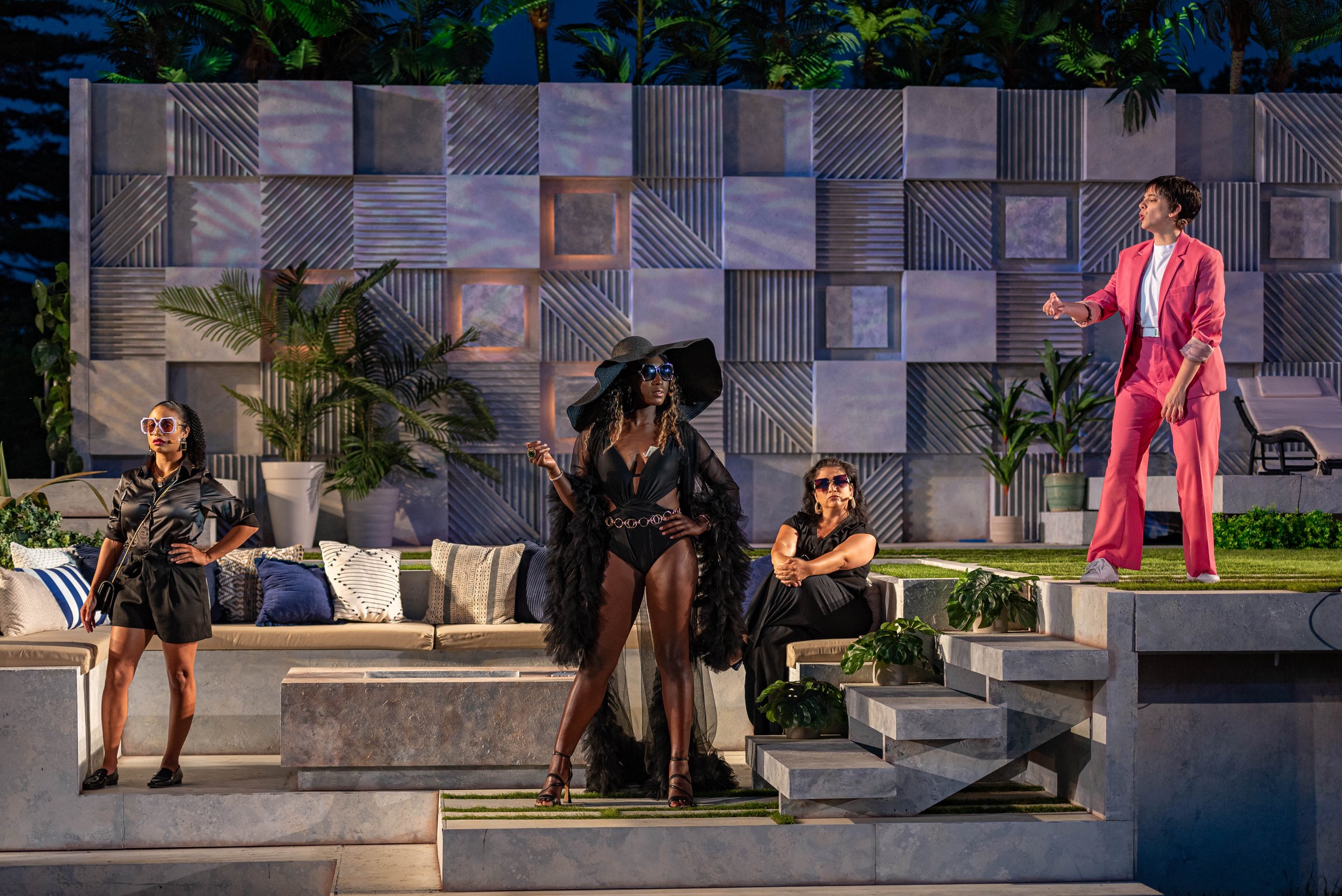All the World’s a Stage
Celebrating its 25th year, the Shakespeare Festival unveils its 2025 season, including a joint venture with the Saint Louis Zoo
by Mary Martin / Photos courtesy of the Shakespeare Festival
If you’ve ever joyfully schlepped a blanket, a basket and a bestie for an evening of free, live theatre in Forest Park, then you know the St. Louis Shakespeare Festival.
If none of that rings a bell, you will be surprised to know that the Festival has welcomed upwards of 50,000 people to the park for its summer shows, making it the largest free outdoor Shakespeare Festival between either coast. This year the organization is celebrating its 25th Anniversary and, appropriately for a big one, is planning big things.
Crosby Kemper, then living in St. Louis and more recently the former director of the Institute of Museum and Library Services, inspired and cajoled a diverse group of friends and local luminaries to make the dream of free Shakespeare come true, just as he had done in his hometown of Kansas City. Lana Pepper was the first managing director of the Festival, an indefatigable den mother of sorts, a Wendy to “the lost boys” who almost single handedly oversaw the nuts and bolts in those first days.
King Lear.
An early “Friendraiser” involved the production of Tom Stoppard’s “The Fifteen Minute Hamlet” in art benefactor Alison Ferring’s backyard in the Central West End. Board member, attorney and the man behind Schlafly Brewing, Tom Schlafly, stood in as a memorable ghost. The organizers wrangled and begged for publicity (and funds, too, since it did cost money to offer FREE Shakespeare). Giddy with dreams, adrenalin and motivation, they built a war chest to put on “Romeo and Juliet,” the first play in the park, directed by the late director P.J. Paparelli. Kiku Obata of Kiku Obata & Company designed the Festival’s signature poster, as she would for many years to follow.
“On opening night of the first season of the Shakespeare Festival, the organizers and board of directors were hoping for an audience of a few hundred,” Pepper recalled. “But an army of St. Louisans came marching over the hill with their folding chairs in tow. They kept advancing until there were around 3,000 covering the hillside. It was as if St Louis had been waiting for Shakespeare in the park. At the time that the trumpets heralded the start of “Romeo and Juliet,” I was at the top of the hill openly crying in big gasping, happy sobs. Exhaustion and joy can do that.”
The Tempest.
This was an era of firsts. As Schlafly observed, “Unlike a real ghost, I was not able to pass quietly through Alison’s screen door but literally crashed through. In some ways my performance portended the way the Shakespeare Festival so visibly and memorably burst on the scene in May of 2000.”
Year after year, the Festival has presented Shakespeare’s works reimagined in creative ways. That gasp of wonder and exhilaration Lana described still fuels the audience, starry-eyed under the stars. The founders’ early efforts set the stage for what would become not only an annual tradition in Shakespeare Glen, but also programming the original founders hadn’t imagined, beyond the realm of Forest Park. In 2012, the organization debuted Shakespeare in the Streets, a collaboration with local neighborhoods to create original productions, blending Shakespearean themes with that community’s unique stories.
The Merchant of Venice.
“The Festival is incredibly fortunate to have Tom Ridgely as its Producing Artistic Director,” said Stephanie Riven, the founding director of the Center of Creative Arts. “Since 2018, Tom has brought a wealth of experience as a Drama Desk-nominated director, collaborating with top-tier artists and institutions, from The Public Theater to the Oregon Shakespeare Festival.”
St. Louis Shakespeare Festival Producing Artistic Director Tom Ridgely Announces 25th Anniversary Season.
In 2019, under Ridgely, the Festival launched the Confluence Writer’s Project, which while not anchored by Shakespeare’s original works, exemplifies the Bard’s passion for playwriting. That effort was followed by TourCo in 2021, an annual traveling production that takes the Festival out of Forest Park and into dozens of parks, parking lots, plazas and even basketball courts across Missouri and Illinois, bringing the Festival to areas that otherwise have no access to arts programming. The two-week summer run has expanded to year-round programming, accessed by thousands, and is a destination for locals and out-of-towners.
This year, to mark its 25th production in Shakespeare Glen, the Festival picked “Hamlet” (last staged for its 10th anniversary in 2010). Renowned Shakespeare director Michael Sexton of New York will bring a modern take on the play beginning May 28.
As You Like It.
And as a crowd-pleasing bookend to that first production of “Romeo and Juliet,” the Festival will follow up “Hamlet” with a completely new program and partner – the Saint Louis Zoo. Six nights a week beginning July 8, the Festival will produce “Romeo & Zooliet,” featuring life-size animal puppetry by Michael Curry Design, the designers of Broadway's “The Lion King” and “Frozen.”
Twelfth Night.
The Shakespeare Festival’s commitment to radically accessible free theater is made possible through the support of hundreds of Festival members and supporters throughout the year. Lead support of the 2025 Season comes from Edward Jones, the Regional Arts Commission’s ARPA for the Arts, the Whitaker Foundation, PNC ArtsAlive, Switch, Missouri Arts Council, Pershing Charitable Trust and The Hearst Foundations.
As founder Crosby Kemper said: “In these times there is very little that is universal but every summer in the park there is the universal poet-playwright of the world, William Shakespeare!”







